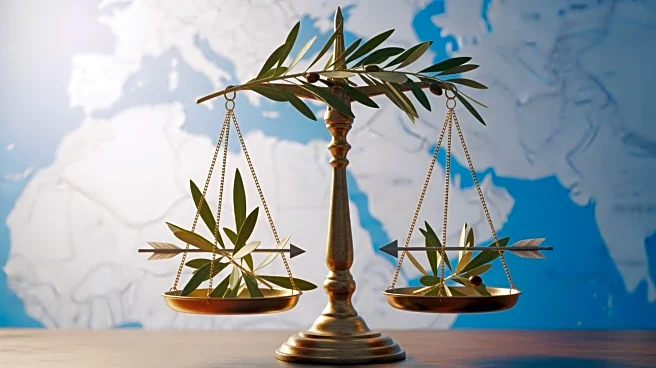What's Happening?
Iraq is approaching parliamentary elections on November 11, with Prime Minister Mohammad Shia al-Sudani highlighting the country's relative calm and prosperity. Al-Sudani has overseen a construction boom and hired over a million civil servants, addressing
unemployment but risking state bankruptcy. Despite these developments, concerns persist about Iraq's relationship with Iran, especially as Iran faces pressure from the United States and Israel. Al-Sudani's government has been criticized for rampant corruption, including the theft of $2.5 billion in tax revenue, benefiting Iran-backed oligarchs and militias. The Prime Minister has awarded government contracts to these militias, raising security concerns over control of Iraq's data network.
Why It's Important?
The situation in Iraq is significant due to its geopolitical implications, particularly its relationship with Iran. Iraq serves as an economic lifeline for Iran, which is under U.S. sanctions. The upcoming elections could influence Iraq's political landscape, potentially affecting its ties with both Iran and the U.S. Al-Sudani's actions, such as awarding contracts to militias, could impact Iraq's internal security and its ability to maintain sovereignty. The U.S. Treasury's sanctions on entities linked to these militias indicate potential shifts in U.S. policy towards Iraq, which could affect regional stability and economic conditions.
What's Next?
As Iraq heads into elections, the political dynamics may shift depending on the outcome. Al-Sudani's ability to form a multisectarian coalition could influence his political leverage. However, he remains politically constrained by the dominant Shiite faction backed by Iran. The U.S. may continue its maximum-pressure campaign on Iran, potentially affecting Iraq's political and economic environment. The security concerns related to militia control over data networks could lead to further scrutiny and actions by international stakeholders.
Beyond the Headlines
The deeper implications of Iraq's current situation involve the ethical and security concerns of militia influence over government contracts and data networks. This raises questions about Iraq's sovereignty and the potential for increased surveillance by Iran. The sectarian power-sharing system, intended to promote pluralism, has become a patronage mill, limiting political change. The U.S.'s approach to Iraq, particularly under President Trump, could lead to changes in diplomatic and economic strategies, affecting Iraq's future stability.















